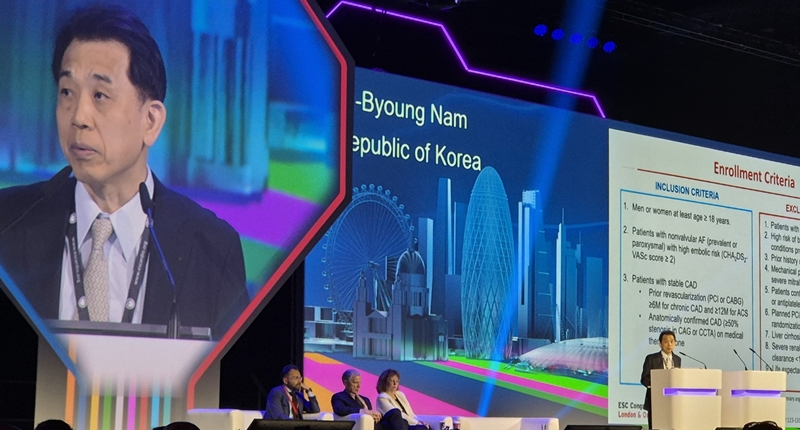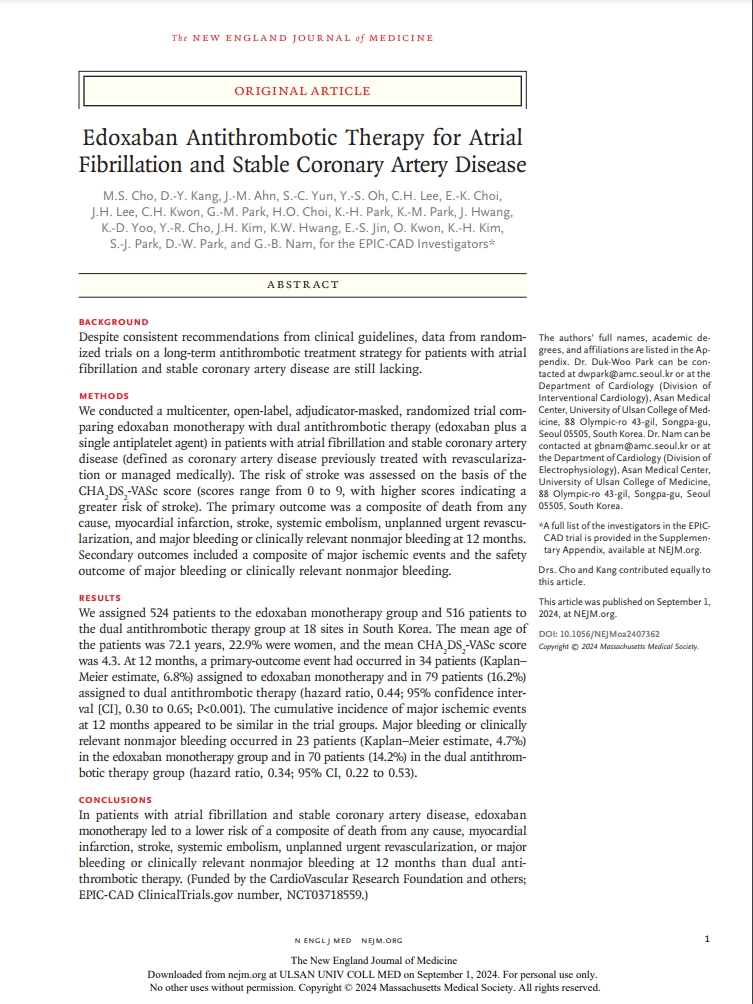-
- Global AMC MENU
- NEWS
- HEALTH
- PEOPLE
- Introduction
AMC Heart Institute Publishes Ninth Paper in NEJM, Textbook Reference for Clinicians Worldwide
Team Led by Professors Gi-Byoung Nam and Duk-Woo Park Analyzes the Effectiveness of ‘Anticoagulant Monotherapy’ Compared to Conventional Dual-Antithrombotic Therapy
Major Clinical Events, Including Death and Bleeding, Decreased by 56% after One Year… “Optimizing Treatment Guidelines Expected to Improve Prognosis”

▲On September 1st (Sunday), Professor Gi-Byoung Nam of the Division of Cardiology at Asan Medical Center is presenting at the European Society of Cardiology (ESC) Congress 2024 held in London, UK.
Coronary artery disease, which involves the blockage of blood vessels supplying blood to the heart, such as in angina or myocardial infarction, is a common and dangerous condition, being the leading cause of death worldwide. Atrial fibrillation, characterized by irregular heartbeat, is the most prevalent of all types of arrhythmias. As a result, patients with both coronary artery disease and atrial fibrillation are common and increasingly observed.
Traditionally, coronary artery disease has been treated with antiplatelet drugs and atrial fibrillation with anticoagulants. However, the simultaneous long-term use of both medications in patients with both coronary artery disease and atrial fibrillation has been known to carry significant risks of side effects, calling for an optimal treatment strategy.
Recently, a team led by Professors Gi-Byoung Nam, Duk-Woo Park, Min Soo Cho, and Do-Yoon Kang of the Division of Cardiology at Asan Medical Center published findings that patients with atrial fibrillation and stable coronary artery disease who were on monotherapy for atrial fibrillation experienced a significantly lower rate of major clinical events, such as death, stroke, myocardial infarction, and bleeding, after one year compared to those who were on both coronary artery disease and atrial fibrillation medications, indicating a safer treatment approach.
The findings were published in the New England Journal of Medicine (NEJM), a textbook reference for clinicians worldwide. With this publication, AMC Heart Institute became the first in Asia to publish nine papers in NEJM. NEJM, with an impact factor of 96.2, surpasses Nature (50.5) and Science (44.7), making it the most prestigious clinical research journal with significant influence on global treatment guidelines.

▲The research paper by Professors Gi-Byoung Nam, Duk-Woo Park, Min Soo Cho, and Do-Yoon Kang, published in the New England Journal of Medicine (NEJM).
AMC team led by Professors Gi-Byoung Nam, Duk-Woo Park, Min Soo Cho, and Do-Yoon Kang of the Division of Cardiology analyzed the one-year treatment effects of 1,040 patients with high-risk atrial fibrillation and stable coronary artery disease. The team found that the anticoagulant monotherapy group had an approximately 56% lower rate of major clinical events, including death, stroke, myocardial infarction, and bleeding compared to the dual-antithrombotic therapy group, which received both anticoagulants and antiplatelet drugs.
AMC team led by professors of the Division of Cardiology presented these findings on Sunday, September 1, during the main session, known as the ‘Hot Line,’ at the European Society of Cardiology (ESC) Congress 2024, the world’s most prestigious academic conference in cardiology, held in London, UK, for four days from August 30.
Atrial fibrillation, a type of arrhythmia, is a condition where the atria, which serve as the heart’s auxiliary pumps, fail to contract properly and quiver. It is estimated that one in ten patients with coronary artery disease, such as angina or myocardial infarction, also suffers from atrial fibrillation.
Coronary artery disease is treated with antiplatelet agents to prevent issues in blood flow caused by arteriosclerosis. In contrast, atrial fibrillation is treated with anticoagulants to prevent thrombus, commonly called blood clot, from forming in the heart.
Although the mechanisms of the two drugs are different, concomitant administration of antiplatelet and anticoagulant drugs has been known to increase the risk of side effects because both work to thin the blood.
AMC team led by Professors Gi-Byoung Nam, Duk-Woo Park, Min Soo Cho, and Do-Yoon Kang of the Division of Cardiology randomly assigned 1,040 patients with high-risk atrial fibrillation and stable coronary artery disease at 18 domestic institutions. The patients were divided into an anticoagulant monotherapy group of 524 patients who received edoxaban only and a dual-antithrombotic therapy group of 516 patients treated with a combination of both an anticoagulant (edoxaban) and antiplatelet agent (aspirin or clopidogrel). The team analyzed the treatment effects after one year.
The results showed that the incidence of major clinical events, such as death, stroke, myocardial infarction, and bleeding, was 16.2% in the dual-antithrombotic therapy group compared to 6.8% in the anticoagulant monotherapy group, representing approximately a 56% lower rate of major clinical events in the monotherapy group.
According to the analysis, this outcome was attributed to a roughly 66% reduction in bleeding events. While major and non-major bleeding events occurred in 14.2% of the dual-antithrombotic therapy group, the incidence was 4.7% in the monotherapy group. The rates of major ischemic events, including death, stroke, and myocardial infarction, were similar in both groups, with 1.8% in the dual-antithrombotic therapy group and 1.6% in the monotherapy group.
Professor Gi-Byoung Nam of the Division of Cardiology at Asan Medical Center stated, “Given the lack of clinical data on the optimal treatment of patients with coronary artery disease and atrial fibrillation, we obtained crucial results that could change treatment guidelines through this multi-center study. We will strive to optimize drug treatment guidelines through this study to improve the prognosis of patients.”
Professor Duk-Woo Park of the Division of Cardiology at Asan Medical Center added, “Atrial fibrillation and coronary artery disease can be fatal in severe cases, but proper treatment can alleviate symptoms and prevent secondary damage. Therefore, it is important for patients to consult with a specialist and develop a treatment strategy optimized for them, rather than changing or discontinuing treatment on their own.”
Since 2003, when the team led by Endowed-Chair Professor Seung-Jung Park of the Division of Cardiology team first published a paper in NEJM, AMC Heart Institute has consistently published nine papers on topics including coronary artery disease, valvular diseases, and arrhythmias. These publications have had a profound impact on clinical practice and treatment guidelines worldwide. This academic achievement is unparalleled in the Asia-Pacific region and is considered an exceptional accomplishment globally, as it is extremely rare for a single institution to publish nearly ten papers in NEJM.
 서울아산병원 심장내과 남기병, 박덕우, 조민수, 강도윤 교수.jpg)












